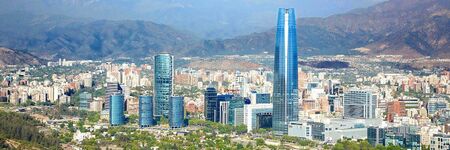Santiago de Chile: Difference between revisions
Created page with "{{Infobox municipality |municipality= City |established = 12 February 1541 |image = Montaje de Santiago de Chile (202103220).jpg |image_caption = |image_seal = Escudo_de_Sant..." |
No edit summary |
||
| Line 1: | Line 1: | ||
{{Infobox municipality | {{Infobox municipality | ||
|image=Santiago Skyline.jpg | |||
|image_caption=Santiago de Chile Skyline | |||
|image = | |image_seal=Escudo_de_Santiago_(Chile).svg | ||
|image_caption = | |municipality=City | ||
|image_seal = Escudo_de_Santiago_(Chile).svg | |established=February 12, 1541 | ||
|area = 247.6 | |area=247.6 | ||
|elevation = 1870 | |elevation=1870 | ||
|population = 6,269,384 | |population=6,269,384 | ||
|website = http://www.gobiernosantiago.cl/ | |website=http://www.gobiernosantiago.cl/ | ||
|description=Santiago also known as Santiago de Chile, is the capital and largest city of Chile as well as one of the largest cities in the Americas. It is the center of Chile's most densely populated region, the Santiago Metropolitan Region, whose total population is 8 million, of which more than 6 million live in the city's continuous urban area. The city is entirely in the country's central valley. Most of the city lies between 500–650 m (1,640–2,133 ft) above mean sea level. | |||
|description= | |||
Santiago also known as Santiago de Chile, is the capital and largest city of Chile as well as one of the largest cities in the Americas. It is the center of Chile's most densely populated region, the Santiago Metropolitan Region, whose total population is 8 million, of which more than 6 million live in the city's continuous urban area. The city is entirely in the country's central valley. Most of the city lies between 500–650 m (1,640–2,133 ft) above mean sea level. | |||
}} | }} | ||
Founded in 1541 by the Spanish conquistador Pedro de Valdivia, Santiago has been the capital city of Chile since colonial times. The city has a downtown core of 19th-century neoclassical architecture and winding side-streets, dotted by art deco, neo-gothic, and other styles. Santiago's cityscape is shaped by several stand-alone hills and the fast-flowing Mapocho River, lined by parks such as Parque Forestal and Balmaceda Park. The Andes Mountains can be seen from most points in the city. These mountains contribute to a considerable smog problem, particularly during winter, due to the lack of rain. The city outskirts are surrounded by vineyards and Santiago is within an hour of both the mountains and the Pacific Ocean. | Founded in 1541 by the Spanish conquistador Pedro de Valdivia, Santiago has been the capital city of Chile since colonial times. The city has a downtown core of 19th-century neoclassical architecture and winding side-streets, dotted by art deco, neo-gothic, and other styles. Santiago's cityscape is shaped by several stand-alone hills and the fast-flowing Mapocho River, lined by parks such as Parque Forestal and Balmaceda Park. The Andes Mountains can be seen from most points in the city. These mountains contribute to a considerable smog problem, particularly during winter, due to the lack of rain. The city outskirts are surrounded by vineyards and Santiago is within an hour of both the mountains and the Pacific Ocean. | ||
Santiago is the cultural, political and financial center of Chile and is home to the regional headquarters of many multinational corporations. The Chilean executive and judiciary are located in Santiago, but Congress meets mostly in nearby Valparaíso. Santiago is named after the biblical figure St. James. The city will host the 2023 Pan American Games. | Santiago is the cultural, political and financial center of Chile and is home to the regional headquarters of many multinational corporations. The Chilean executive and judiciary are located in Santiago, but Congress meets mostly in nearby Valparaíso. Santiago is named after the biblical figure St. James. The city will host the 2023 Pan American Games. | ||
Latest revision as of 06:13, April 26, 2022
- Members
Santiago also known as Santiago de Chile, is the capital and largest city of Chile as well as one of the largest cities in the Americas. It is the center of Chile's most densely populated region, the Santiago Metropolitan Region, whose total population is 8 million, of which more than 6 million live in the city's continuous urban area. The city is entirely in the country's central valley. Most of the city lies between 500–650 m (1,640–2,133 ft) above mean sea level.
Activities

|
Electric Bus Deployments in Santiago de Chile | |
| An electric bus implementation program in Santiago, Chile, inspired by the buses in Bogotá, Colombia, began in 2014 through a partnership between the Chilean Ministry of Transport and two privately held companies, Enel X and BYD, an Italian electric company and a Chinese bus making manufacturer, respectively. | ||
Details
Founded in 1541 by the Spanish conquistador Pedro de Valdivia, Santiago has been the capital city of Chile since colonial times. The city has a downtown core of 19th-century neoclassical architecture and winding side-streets, dotted by art deco, neo-gothic, and other styles. Santiago's cityscape is shaped by several stand-alone hills and the fast-flowing Mapocho River, lined by parks such as Parque Forestal and Balmaceda Park. The Andes Mountains can be seen from most points in the city. These mountains contribute to a considerable smog problem, particularly during winter, due to the lack of rain. The city outskirts are surrounded by vineyards and Santiago is within an hour of both the mountains and the Pacific Ocean.
Santiago is the cultural, political and financial center of Chile and is home to the regional headquarters of many multinational corporations. The Chilean executive and judiciary are located in Santiago, but Congress meets mostly in nearby Valparaíso. Santiago is named after the biblical figure St. James. The city will host the 2023 Pan American Games.

